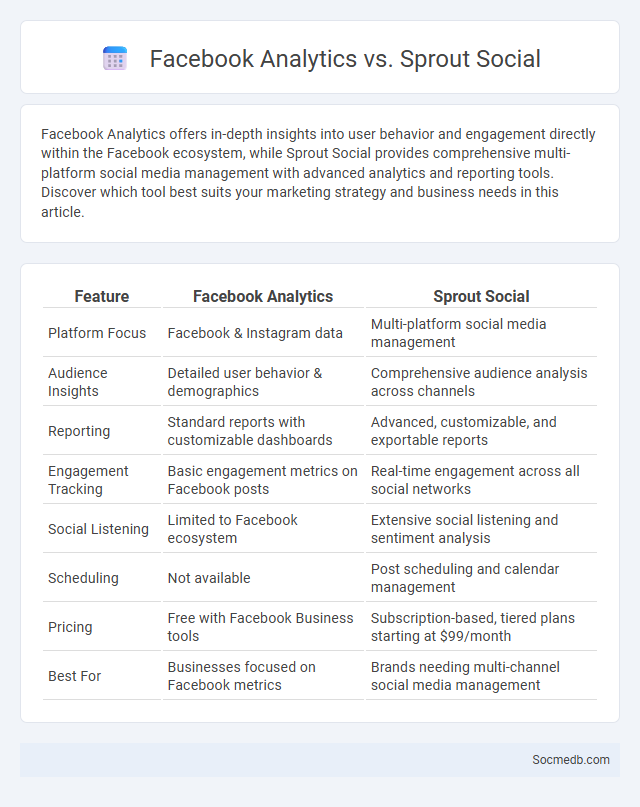
Photo illustration: Facebook Analytics vs Sprout Social
Facebook Analytics offers in-depth insights into user behavior and engagement directly within the Facebook ecosystem, while Sprout Social provides comprehensive multi-platform social media management with advanced analytics and reporting tools. Discover which tool best suits your marketing strategy and business needs in this article.
Table of Comparison
| Feature | Facebook Analytics | Sprout Social |
|---|---|---|
| Platform Focus | Facebook & Instagram data | Multi-platform social media management |
| Audience Insights | Detailed user behavior & demographics | Comprehensive audience analysis across channels |
| Reporting | Standard reports with customizable dashboards | Advanced, customizable, and exportable reports |
| Engagement Tracking | Basic engagement metrics on Facebook posts | Real-time engagement across all social networks |
| Social Listening | Limited to Facebook ecosystem | Extensive social listening and sentiment analysis |
| Scheduling | Not available | Post scheduling and calendar management |
| Pricing | Free with Facebook Business tools | Subscription-based, tiered plans starting at $99/month |
| Best For | Businesses focused on Facebook metrics | Brands needing multi-channel social media management |
Introduction to Social Media Analytics Tools
Social media analytics tools enable businesses to track, measure, and analyze digital engagement and audience behavior across platforms like Facebook, Twitter, and Instagram. These tools provide insights through metrics such as reach, impressions, sentiment analysis, and conversion rates, facilitating data-driven marketing strategies. Popular analytics platforms include Hootsuite, Sprout Social, and Google Analytics, which offer dashboards and reporting features for real-time performance monitoring.
Overview of Facebook Analytics
Facebook Analytics provides in-depth insights into user behavior, engagement patterns, and conversion metrics across Facebook pages and apps. It tracks key performance indicators like page views, click-through rates, and demographic data, enabling businesses to optimize marketing strategies. Integration with Facebook Ads Manager and Audience Insights enhances targeting precision and campaign effectiveness.
Overview of Sprout Social
Sprout Social is a comprehensive social media management platform designed to streamline content scheduling, audience engagement, and analytics across multiple social networks. Featuring powerful tools like social listening, competitive analysis, and customer relationship management (CRM) integration, Sprout Social enables businesses to optimize their social media strategies effectively. With support for platforms including Facebook, Twitter, Instagram, LinkedIn, and Pinterest, it provides detailed reporting and collaboration features ideal for marketing teams and agencies.
Overview of Facebook Insights
Facebook Insights provides detailed analytics on page performance, audience demographics, and user engagement metrics, helping businesses measure the effectiveness of their social media strategies. Key data points include reach, impressions, page likes, post interactions, and video views, enabling firms to optimize content and posting schedules. The platform's real-time reporting and trend analysis support informed decision-making to boost brand visibility and customer engagement.
Key Features Comparison
Social media platforms vary widely in their key features, with Facebook emphasizing community groups and event organization, Instagram prioritizing visual content sharing and Stories, and Twitter focusing on real-time updates and trending topics. LinkedIn stands out for professional networking and job search tools, while TikTok specializes in short-form video content with algorithm-driven recommendations. Understanding these distinct functionalities helps users choose the best platform for engagement, marketing, or networking goals.
Data Accuracy and Reporting Capabilities
Accurate data in social media analytics ensures your marketing strategies are based on reliable insights, allowing precise audience targeting and campaign optimization. Advanced reporting capabilities provide real-time metrics and in-depth performance analysis across platforms like Facebook, Instagram, and Twitter. You benefit from customizable dashboards that visualize trends, engagement rates, and conversion data, enhancing decision-making and ROI measurement.
User Interface and Ease of Use
Social media platforms prioritize intuitive user interfaces to enhance ease of use, enabling seamless navigation and content sharing. Features like customizable feeds, simple interaction buttons, and responsive design improve user engagement and retention. Streamlined onboarding processes and accessible settings contribute to a positive user experience across diverse demographics.
Integration with Other Platforms
Integrating social media with other platforms enhances your digital presence by streamlining content sharing and increasing audience engagement across multiple channels. Tools like API connections and social media management software enable seamless synchronization between social networks, websites, and email marketing systems. Optimizing this integration boosts brand consistency and provides comprehensive analytics for better decision-making.
Pricing and Subscription Models
Social media platforms offer a variety of pricing and subscription models tailored to individual and business needs, including freemium access with optional premium tiers for enhanced features. These subscription plans often provide benefits such as ad-free experiences, advanced analytics, and priority customer support to optimize Your social media engagement. Understanding the cost structures and feature sets helps users select the most cost-effective option for maximizing their online presence.
Which Tool is Best for Your Business Needs?
Choosing the best social media tool for your business needs depends on factors like audience engagement, content scheduling, and analytics capabilities. Platforms such as Hootsuite offer comprehensive scheduling and monitoring features, while Buffer excels in ease of use and streamlined publishing. Your decision should align with your marketing goals, budget, and the specific functionalities that enhance your brand's online presence.
 socmedb.com
socmedb.com